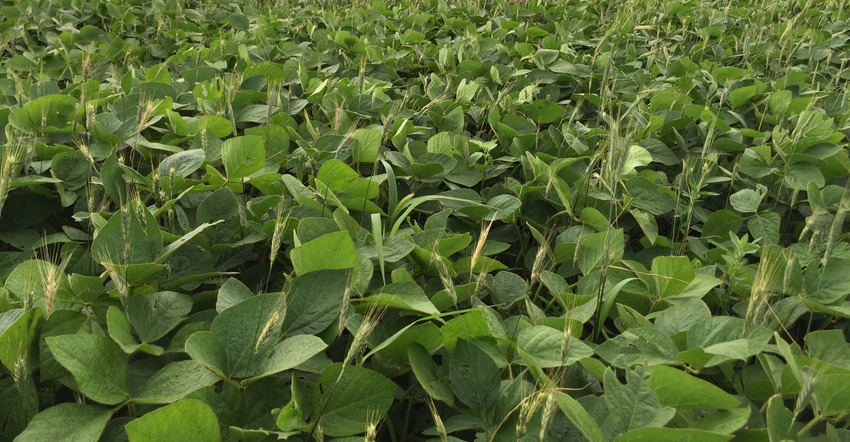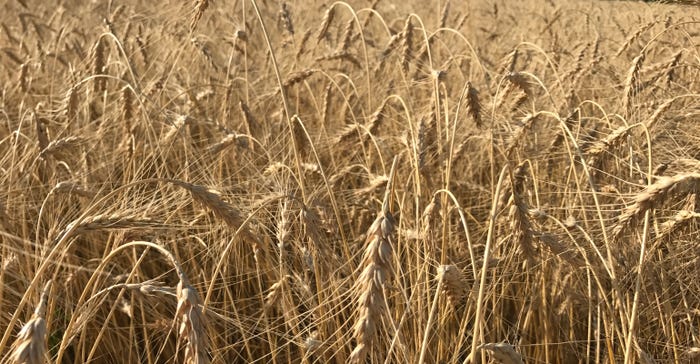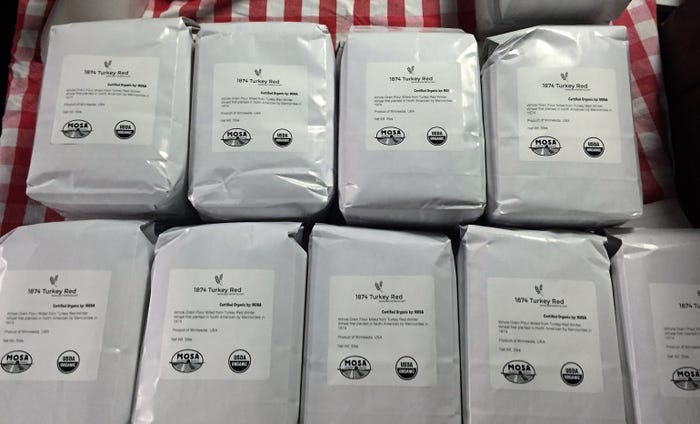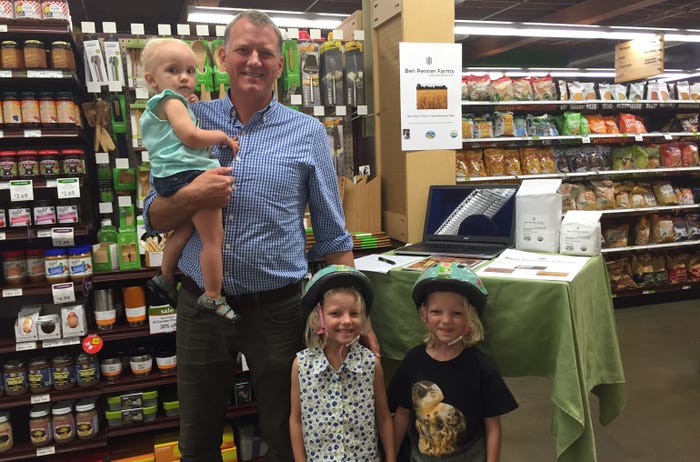
Ben Penner likes to find new ways of doing things. He also has a keen sense of history, fond memories of growing up on the farm and a strong interest in agriculture.
Together, those things help explain why a guy who grew up in the wide-open spaces of south-central Kansas is growing organic Turkey Red hard red winter wheat and human food-grade soybeans on a small acreage in south-central Minnesota.
Penner started his small, certified organic operation in 2009 after moving to Minnesota where his wife is a professor of geography and department chair at Gustavus Adolphus College in the Nicollet County town of St. Peter. He had already spent several years in a publishing career and had a good knowledge of marketing. In addition, he has a part-time job with a local large-scale farmer and enjoys spending family time with his wife and three children, 7-year-old twins Grace and Lucia and 3-year-old Eva.
His marketing expertise told him that the growing interest in local food markets and a proliferation of food coops added up to a promising opportunity to create vintage products that would appeal to buyers looking for those unique foods.
 TURKEY RED: Ben Penner grows organic Turkey Red winter wheat on his Minnesota farm. An agreement with a local mill enables him to market the heritage brand as flour in food cooperatives.
TURKEY RED: Ben Penner grows organic Turkey Red winter wheat on his Minnesota farm. An agreement with a local mill enables him to market the heritage brand as flour in food cooperatives.

The crop Penner knew best was wheat, so he hit upon the idea of offering wheat products, especially flour, from the heritage variety famous in Kansas — Turkey Red — the wheat brought to America by his Russian Mennonite ancestors.
“My first challenge was finding seed,” he says. “I started shopping for Turkey Red winter wheat seed and I couldn’t find any dealers. So, I asked my Dad (Marion County wheat farmer and past president of the National Association of Wheat Growers, Paul Penner) and he suggested I try Ehmke Seed in Dighton. So I got in touch with Louise Ehmke and she shipped me a couple of bushels of seed.”
Penner planted a few acres of Turkey Red in the fall of 2015 and says it did “surprisingly well, in fact much better than I expected.” In the fall of 2016, he ordered more seed and planted it on ground that he was rotating out of alfalfa.
“That year, it did even better,” Penner says. “The only real problem that I’ve had is lodging. It is a very tall wheat and when the grain fills, it does fall over. But I have been surprised that even with lodging, it did a really good job of shading out weeds. I’ve had to rum the combine a little slower and closer to the ground but with it being clean underneath, I was able to pick it up.”
Penner says he may be the only farmer in Minnesota growing Turkey Red hard winter wheat. Most of the state’s wheat crop is spring wheat and even farmers growing winter wheat generally opt for newer, higher yielding varieties.
He found a miller and baker in the Twin Cities and works with him to package and distribute flour.
“For the last two years I have been actively marketing and selling the flour and it’s now in 15 or 16 stores. I visit the food coops and the organic market is growing steadily. There are people who are committed to organic and a number of people who also like the idea that this is a heritage variety – kind of the original winter wheat,” he says. Among the stores carrying Ben Penner Farm flour is the Prairie Harvest store in Newton, Kansas.
Penner says he is in the organic niche because it offers him an opportunity to succeed with farming on very limited acres.
He says he has planted other varieties of both spring and winter wheat and got 14.5% protein with a brand new spring variety, Bolles, from the University of Minnesota.
“I try to blend the best of new research and techniques with tools, varieties and concepts from the past that might still be applicable today,” he says.
Along with Turkey Red winter wheat, he has settled into a system of cover crops and rotation that seems to be working for him.
“I have added some land; I’m up to 43 acres now. I plant about half of it in wheat — spring wheat and winter wheat and the other half in human-food, organic soybeans. I tried alfalfa, but more recently, I have gone with a system for growing the soybeans that involves cover crops,” he says.
 FLOUR FOR SALE: Bags of organic Turkey Red winter wheat flour are a niche product from the Minnesota farm of Kansas native Ben Penner.
FLOUR FOR SALE: Bags of organic Turkey Red winter wheat flour are a niche product from the Minnesota farm of Kansas native Ben Penner.

That system involves planting winter rye as a cover crop in the fall, swathing it in May and planting soybeans into the residue.
“There is something agronomic about the rye that it prevents germination of the two most troublesome weeds, pigweed and lambsquarter. It keeps the pressure down until the soybeans are up and form a canopy,” he says.
He says that system has worked so well that he has expanded it and other farmers are beginning to adopt it, as well.
“This is a system that actually works in mid-sized or larger farms as well. There is a guy in Wisconsin that has 800 acres of soybeans that he grows into rye cover crop. He uses a crimper-roller to kill the rye when he plants the beans but the residue provides weed control,” Penner says.
Penner rents his ground for farming and says he has seen a growing interest from other farmers who want to know more about what he’s doing and whether his systems approach might work for them.
He sees room for a many young and beginning farmers who might want to enter the field.

VISIT TO THE CO-OP: Ben Penner stands in front of the shelves advertising his farm. He is holding Eva, who is now 3. The twins, Grace and Lucia, are now 7.

“I believe what we need is more people involved in agriculture and systems and markets that accommodate a lot of different sizes of complementary operations,” he says. “The idea is to add value to small parcels of land when you can’t really get the value out of bigger equipment. A 60-foot planter is great if you want to get 200 or 300 acres planted quickly. But it’s not so good on a 20-acre field. You don’t get the value from it, so you need to figure out another way to make that work.”
One thing that he finds encouraging, Penner says, is the commonality of working in agriculture, whether on his small, organic plots or on the sprawling fields his dad farms in Kansas.
“All of us face a lot of the same challenges,” he says. “Weed pressure, diseases, weather, the need for producing quality and finding markets. We have all of that in common. I find a lot of friends and neighbors who are interested in what I’m doing and how I make it work. I think what it’s really about is all of us exploring all types of crops and figuring out how to provide food to people.”
You can follow Ben Penner Farms on Facebook, Instagram and Twitter.
About the Author(s)
You May Also Like




